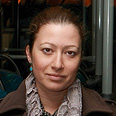
Until yesterday, I was sure that I live in a free country. I was certain that a person’s dignity and freedom are supreme values in our diverse society. Indeed, there are calls against one group or another, but people, whoever they are, regardless of religion, creed or gender, will be respected, because this is the kind of society I grew up in. These are the values I learned.
However, a short while after I boarded Egged’s Route 451 bus from Ashdod to Jerusalem, I was proven wrong. As it turned out, not everyone adheres to the dictum: Derech Eretz Kadma LaTorah (proper behavior comes before the Torah.)
The bus I boarded passed through haredi neighborhoods. I took it because it stops five minutes from my destination, in Jerusalem. Only after the driver was surprised by my presence did I understand where I was. I sat behind him so he can tell me exactly where to disembark, yet apparently not everyone thought I’m permitted to sit there.
It’s still hard for me to believe that in the year 2011 there are men who believe they must not sit behind a woman.
One of the passangers was unwilling to sit down and stayed on the stairs next to the driver the whole trip, yet another passenger decided to create a commotion. He prevented the driver from shutting the door and called his friends, who arrived at the site and gathered around the bus. There were about 20 of them, they spoke in Yiddish, and it appeared as though a small rally was organized to charge that this bus is theirs, via a deal with the Egged company, and that whoever boards it must adhere to the community’s demands.
They repeated this claim in Hebrew too, even though the driver attempted to explain to them that this is a regular Egged bus route and is not characterized a “kosher” one.
Policeman asked me to move
I must admit I was a little scared at that point. Nobody bothered to turn to me and ask me to do what seemed so logical to them – for me to move to the back. They made do with pointing at me, calling me names, and expressing outrage over Egged’s failure to safeguard their rights. I must admit I still don’t understand what these rights are.
The driver, who saw he cannot continue, called the police. When the police officer arrived, he traded a few words with the driver, spoke at length with the organizer of the spontaneous protest, and then boarded the bus in order to ask me whether I am willing to respect them and move to the back of the bus. He repeated the question twice. He was also the first to turn to me and speak to me all that time.
I replied that I showed enough respect for them with my modest dress and that I cannot humiliate myself in order to respect someone else. They must ask themselves how it could be that humiliating a woman shows respect to them. How could it be that a man in this day and age feels that a woman is not worthy of sitting before him? How would he feel if his mother, sister or daughter encountered such contempt?
Ultimately, the police officer accepted my refusal, for lack of other choice. The man who organized the protest remained in Ashdod, while the other passengers, including new ones who boarded the bus later, passed me and sat behind me without an incident.
Yet I was left with a few questions following this incident: Why is limiting the rights and freedom of someone else considered fair when it comes in the form of adhering to Jewish law demands? Since when does the Torah come before basic manners? How could religion be used so cynically and how come nobody realized until now that this is a social problem, and that its connection to religion is slim to non-existent? How could it be that an entire community chooses to humiliate its daughters, wives and sisters and nobody raises a hue and cry? Who believes that one could really choose to live a life of humiliation and exclusion?
I’m not anti-religious
It’s important for me to emphasize that I’m not coming out against the haredim or religious. I’m also not speaking out against religion. What bothers me is the State’s attitude to these phenomena throughout its existence. The renunciation of the basic rights of so many citizens for the sake of the minority’s dignity and welfare, and the indifference shown by the State towards these phenomena, which is even encouraged at times.The State of Israel is a country of minorities, and everyone must show consideration to others. It’s important to fight radicalism, wherever it is. Every opinion and every worldview are acceptable, until they are taken to the extreme. There they become dangerous. It can be a hurtful religious edict or anti-haredi calls. It can be a missile fired at Ashdod or “Death to the Arabs” chants.
In Israel of 2011, the war is for individual freedom! War between groups leads to nothing with the exception of a long conflict filled with empty slogans: Arabs against Jews, and haredim against seculars. After all, we all wish to live our life in line with our beliefs, abilities and understanding and to be the best and most successful we choose to be; with an emphasis on the word choice.
We must not allow one pressure group or another to overrun the unique voice of any one of us. Freedom is not a curse word; everyone aspires for it in every society and in any situation. If we give up the stigmas and approach the person who hides behind the words “haredim” or “seculars” we can produce genuine dialogue and possibly minimize the gap between us.
Tanya Rosenblit is a writer and translator. She studies at the Camera Obscura school of arts















